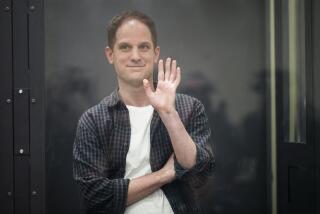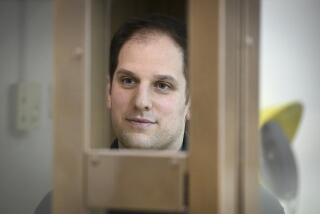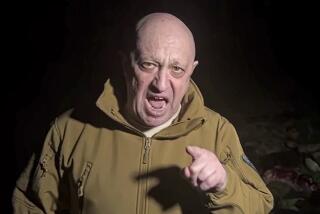Chernobyl Pilot Anatoly Grishchenko
- Share via
SEATTLE — A Soviet helicopter pilot who braved poisonous skies over Chernobyl to help douse the reactor’s runaway nuclear fires died here late Monday--another victim of the planet’s gravest atomic-power disaster.
Four years ago, Anatoly Grishchenko was among the first wave of helicopter pilots to fly over the radioactive inferno at Chernobyl, dumping vats of sand--and then huge buckets of wet concrete--to entomb the reactor.
At home in the Ukraine, and later in the United States, Grishchenko became a hero as the result of his deeds and his touching struggle with leukemia, which is believed to have been caused by exposure to the massive radiation at Chernobyl. The disease weakened him, and he succumbed finally to cardiopulmonary failure at the Fred Hutchinson Cancer Research Center, according to a spokeswoman. He was 53 and had been hospitalized for more than two weeks with a lung infection.
Accounts of Grishchenko’s exploits were chilling and inspiring.
It was twilight on April 26, 1986, when the middle-aged civilian test pilot aimed his Mi-28 helicopter, the world’s largest, toward the rubble of Chernobyl’s No. 4 reactor, which had exploded hours earlier. Glowing, eerie blue vapors streamed half a mile into the evening sky as radiation ionized the air.
A huge bucket suspended on 800-foot cables swung from the belly of the aircraft, carrying giant scoops of sand, and later cement, to quiet the atomic fires. In the fraternity of helicopter pilots, Grishchenko’s pinpoint flying and control of his enormous loads during the three-day struggle to contain the reactor made him an international aeronautical celebrity.
Grishchenko wore protective clothing and his helicopter had been prepared with lead shielding, but neither stopped the deadly radiation. He, along with untold other workers and nearby residents, suffered radiation poisoning.
As he recovered from that, doctors detected the onset of leukemia.
U.S. helicopter pilot Cap Parlier, director of McDonnell Douglas Corp. testing in Mesa, Ariz., took up Grishchenko’s cause after learning the Soviet aviator needed a costly bone-marrow transplant. That was accomplished two months ago, using a French donor, at the cancer center in Seattle.
Grishchenko was made a Hero of the Soviet Union, an award akin to the U.S. Medal of Honor. And more recently, during Mikhail S. Gorbachev’s visit to the United States, the Soviet leader dispatched a personal emissary to deliver a handwritten thank-you note to the hospitalized hero.
Officially, the Soviets say 31 people died in Chernobyl. Unofficial estimates put the toll at 250 to 300. Virtually everyone agrees that the number of deaths will grow as a result of radiation-induced illness.
More to Read
Sign up for Essential California
The most important California stories and recommendations in your inbox every morning.
You may occasionally receive promotional content from the Los Angeles Times.













